

The Saturday poem: Hamlet. ... and it's nearly the end of the year, we have a small favour to ask.
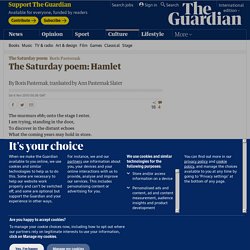
Millions have turned to the Guardian for vital, independent, quality journalism throughout a turbulent and challenging 2020. Readers in 180 countries, including Canada, now support us financially. We believe everyone deserves access to information that’s grounded in science and truth, and analysis rooted in authority and integrity. That’s why we made a different choice: to keep our reporting open for all readers, regardless of where they live or what they can afford to pay.
This means more people can be better informed, united, and inspired to take meaningful action. In these perilous times, a truth-seeking global news organisation like the Guardian is essential. The Little Virtues - Natalia Ginzburg. War Photographer by Carol Ann Duffy. The Windhover by Gerard Manley Hopkins. Collective Nouns for Humans in the Wild by Kathy Fish – .JellyfishReview.
Diving into the Wreck by Adrienne Rich - Poems. First having read the book of myths,and loaded the camera,and checked the edge of the knife-blade,I put onthe body-armor of black rubberthe absurd flippersthe grave and awkward mask.I am having to do thisnot like Cousteau with hisassiduous teamaboard the sun-flooded schoonerbut here alone.
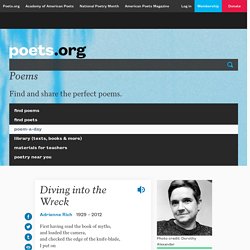
There is a ladder.The ladder is always therehanging innocentlyclose to the side of the schooner.We know what it is for,we who have used it.Otherwiseit is a piece of maritime flosssome sundry equipment. I go down.Rung after rung and stillthe oxygen immerses methe blue lightthe clear atomsof our human air.I go down.My flippers cripple me,I crawl like an insect down the ladderand there is no oneto tell me when the oceanwill begin. First the air is blue and thenit is bluer and then green and thenblack I am blacking out and yetmy mask is powerfulit pumps my blood with powerthe sea is another storythe sea is not a question of powerI have to learn aloneto turn my body without forcein the deep element. The Lake Isle of Innisfree by William Butler Yeats. Morning Song by Sylvia Plath. The Waste Land by T. S. Eliot. Poetry by Marianne Moore - Poems. I too, dislike it: there are things that are important beyond all this fiddle.
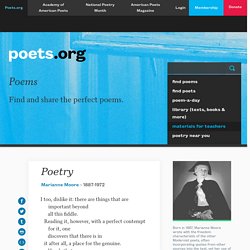
Reading it, however, with a perfect contempt for it, one discovers that there is in it after all, a place for the genuine. Hands that can grasp, eyes that can dilate, hair that can rise if it must, these things are important not because a high-sounding interpretation can be put upon them but because they are useful; when they become so derivative as to become unintelligible, the same thing may be said for all of us—that we do not admire what we cannot understand. The Truth the Dead Know by Anne Sexton. “Workday” – live in the layers. Perhaps this devastating poem from Chickasaw novelist, essayist, and environmentalist, Linda Hogan (1947- ) will ring as true to you as it does to me… “Workday”
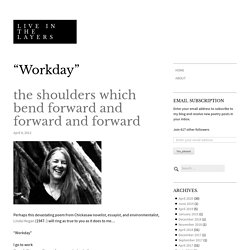
I Am Accused Of Tending To The Past - Lucille Clifton. The Fish by Elizabeth Bishop - Poems. The Fish by Marianne Moore - Poems. Wadethrough black jade.
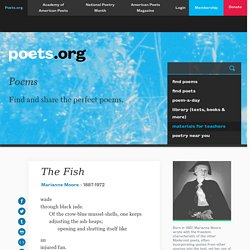
Of the crow-blue mussel-shells, one keeps adjusting the ash-heaps; opening and shutting itself like aninjured fan. The barnacles which encrust the side of the wave, cannot hide there for the submerged shafts of the sun,split like spun glass, move themselves with spotlight swiftness into the crevices— in and out, illuminating theturquoise sea of bodies. Ted Hughes – Six Young Men. Commander Lowell by Robert Lowell. Skunk Hour by Robert Lowell. (For Elizabeth Bishop)Dedication Lowell’s poem is modeled on Elizabeth Bishop’s poem “The Armadillo,” which Bishop had dedicated to Lowell.
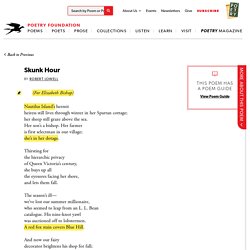
Nautilus Island’sNautilus Island’s Lowell once remarked, “The first four stanzas are meant to give a dawdling more or less amiable picture of a declining Maine sea town.” hermit heiress still lives through winter in her Spartan cottage; her sheep still graze above the sea. In The Park Poem by Gwen Harwood. The Body by Thomas Shapcott. Poem of the Week - 'The Subject of Feeling' by Peter Rose. Our second 'Poem of the Week' is 'The Subject of Feeling by ABR Editor Peter Rose. 'The Subject of Feeling' is the title poem in Rose's latest collection, out now from UWA Publishing, and it was published in the June-July issue of Australian Book Review.
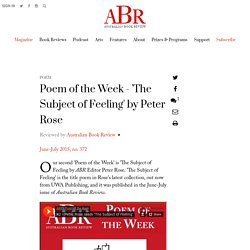
Outside the church, unmemoried,names of the dearest deserting me, I turn as theyload you in the hearse, set offwith a small police escort. For a quarter of a centurywe have been ramming youin cars of various sorts,long before the ageof ramps and hoists. They took longer to prise youfrom the giddified wreck –two hours was the report.Eschatology is a slowremorseless science. Orchards by Jennifer Maiden. Jean Kent’s Travelling with the Wrong Phrasebooks is an immensely likable collection, so likable that readers may miss some of its sophistication, thinking it no more than a set of poems about travels in France and Lithuania.
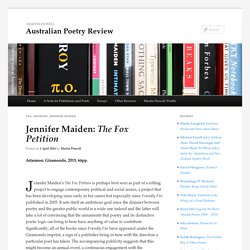
It is actually a good deal more than that. Travel poetry, once it gets beyond the basic level of “I’ve written a poem about my trip to the Grand Canyon”, is usually about the self and the way in which aspects of the self, surprising even to the poet, are revealed when that self is faced by an experience of the alien. It is fine to have poems which come from a continual renewing of contact with some personal sacred ground but the self only develops (or “only reveals itself” – depending on your ideology) by moving into the unfamiliar. Matsuo Basho's Frog Haiku (30 translations) Cultural Precinct by Natalie Harkin — fine print. Cultural Precinct by Natalie Harkin All this creating speaking breathing on Kaurna country demands more than just an acknowledgment of a peoples past present and future, for this place, this space, is abundant with stories and strong families who have always had agency, moving through and resisting what this particular cultural-precinct represents: Tarnanthi – rise, come-forth, spring-up, appear.
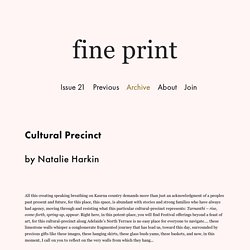
The Latter Days. Travel. Either nothing happens or the landscape happens.
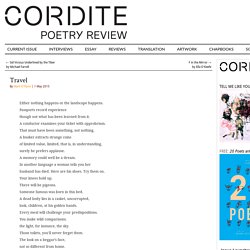
Passports record experience though not what has been learned from it. A conductor examines your ticket with opprobrium. That must have been something, not nothing. A busker extracts strange coins of limited value, limited, that is, in understanding, surely he prefers applause. A memory could well be a dream. Mark O'Flynn's fourth collection of poetry, Untested Cures, was published recently by Picaro Press. Working from home – to do list. 12 buttons brown thread take your psyche for a walk pack the wheelchair into the station wagon for the doctor’s kiss the cat kiss the cat?
Anne Elvey is author of White on White (Cordite Books 2018), Kin (Five Islands Press 2014) and This Flesh That You Know (Leaf Press 2015), and with Massimo D’Arcangelo and Helen Moore co-author of Intatto-Intact (La Vita Felice, 2017). She is managing editor of Plumwood Mountain: An Australian Journal of Ecopoetry and Ecopoetics. She holds honorary appointments at Monash University and University of Divinity. Magnolia by Eileen Chong. A son’s birth means tragedy now.
In a Station of the Metro by Ezra Pound. Five Haiku - Suzuki Shizuko. Plumwood Mountain – An Australian Journal of Ecopoetry and Ecopoetics. Peach by D. H. Lawrence.